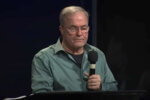He is not without his critics, but Bruce Olsson
is too busy evangelizing the Motilone Indians
of Colombia to worry about what other missionaries think.
It has been more than 40 years since Bruce Olsson, then a 19-year-old college student, said goodbye to his prominent banker father, socialite mother and comfortable lifestyle in St. Paul, Minnesota, to head for South America. He had just $72 and a one-way ticket in his pocket, but in his heart was a burning desire to be God’s missionary to the Latin continent.
Olsson eventually ended up in uncharted northeast Colombian jungles where he found the barbaric Stone Age Motilone Indian tribe. Actually, they found him–and speared him in the thigh. Yet
Olsson stayed, and six years later won his first convert.
The rest, as they say, is history: a gripping true-life account of how one man’s faith changed an entire culture with the saving knowledge of Jesus Christ despite family, friends and missions organizations telling him he was nuts to even try.
The Motilones and their American brother–Olsson considers them family and the jungle his home–have worked hard to improve their quality of life with just enough Western technology to keep their cherished primitive culture intact. They continue to make remarkable progress in spreading the gospel and sharing knowledge and technology with 19 other area tribes.
Olsson has spoken before the United Nations and the Organization of American States, and has developed close friendships with four Colombian presidents. Yet he is probably best known for his nine-month captivity with communist guerrillas from October 1988 to July 1989, which climaxed with his narrowly escaping execution by a firing squad. In the end, about 60 of the guerrillas, including their leader, gave their lives to Christ.
What makes Olsson’s one-man ministry even more unique is that he has never been officially sponsored by any missions organizations. His support base is a loose, grassroots network of supporters that includes readers of Christian Life magazine, which reported on his work years before Charisma’s 1989 story.
Making Jesus Lord of the Jungle
I first met Bruce Olsson eight years ago during one of his rare visits to the United States. He spoke
at a prayer breakfast hosted by Strang Communications, and I later interviewed him for a Charisma news update.
“I love the [United States],” Olsson told us. “It’s where I’m from. But my place on planet Earth is in the jungle, where God has enriched my life. It would be just as difficult for me to remain in the States as it would be for you to go to the jungle where I live. When I return, I always thank God that I can return back to where I feel I belong.”
When they needed someone to drive him to the airport the next day, I volunteered my husband and myself, hoping Greg could hear about this unusual man’s accomplishments. But instead of talking about himself, Olsson was more interested in swapping fishing stories with Greg and asking about the baby we had on the way. We’ve never forgotten his humble, unassuming, quiet spirit.
We’ve kept abreast of his ministry via his occasional newsletters. Olsson reports on the myriad of medical clinics, bilingual schools, agricultural centers and trading cooperatives he and the Motilones have established to
“share Christ’s compassion with others” by providing health care, education and an economic base for area tribes.
He recently wrote that the Motilones have now sponsored more than 400 high school and college graduates. Students move temporarily to Bucaramanga, a city of about 950,000, where they are provided housing, meals, clothing, tuition, books and travel expenses to return home in the middle and at the end of the school year. They keep in touch with
Olsson and tribal elders via the Internet, low-flying satellites and one of 12 computers that Olsson has assembled through the years.
“Students are selected by tribal elders for their spiritual maturity and their discipline in tribal values,” reports Olsson, adding that not one student has opted to remain in city life. They return to the jungle and serve as doctors, nurses, teachers, foresters, accountants, agronomists, pastors and more.
When earthquakes devastated parts of Colombia in January 1999, killing 2,000 and leaving 180,000 homeless, four Motilone physicians and 20 nurses were among the teams of relief workers. They set out to help indigenous tribes living along the quake’s fault line.
“They improvised a simple emergency center that soon became a neighborhood medical hub for arriving relief agencies,” Olsson reported. “More than 5,000 patients received medical and relief support in the ensuing weeks.”
One team member, Federico, later told Olsson: “The magnitude of the tragedy was so enormous…people were broken like their buildings.”
The team also shared the gospel with the tribes. “Hundreds of our patients accepted Jesus and spiritually were reborn. They trust in His future. ”
Leaving the West Behind
For all of Olsson’s success, he is not without his detractors. The Motilone’s remote existence has made it difficult for Olsson to ward off speculation and criticism through the years. Indeed, for Olsson to simply check his e-mail, he treks over jungle trails for three to four days to a clearing so the sun can fire up his laptop computer’s solar panels.
Returning to civilization requires a five-day hike to a river where Olsson constructs a raft for another three- to four-day trip downstream. There’s more hiking when he reaches an old dirt road cut
by U.S. oil companies. “If I’m lucky,” he tells audiences, “a banana truck eventually comes along to take me into town.” And that’s the scenario only when it’s not raining.
It has been said that even native Colombians don’t know how to find Olsson and the Motilones, which led some to accuse him of being a fake. Colombian land settlers said Olsson used the Motilones to mine gold and diamonds. The myth of him lounging in a high-back rattan chair while Motilones waited on him is a far cry from reality, Olsson says,
but nevertheless it was perpetrated by several Colombian newspapers.
In a 1995 revision of his best-selling book, Bruchko (Creation House, 1973), Olsson addresses many of the charges. But his approach mostly has been to do his work, be honest with the Indians and “let everyone think what he wants to think.” He shuns visitors and doesn’t want his village to become a hot spot for short-term missions trips. He’s revered by many as a missionary’s missionary for his maverick, unorthodox approach to missions work and is an outspoken opponent of missionary attempts to “Westernize” other cultures.
Take the medicine man for instance. When missionaries destroy his function, Olsson says, they’re destroying the social order of that people group. “Is such destruction the gospel of Jesus Christ?” he asks. “No. God created the cultures and placed them where they are. If a medicine man resists the missionary’s medicine and kills him, does this missionary then become a ‘martyr’ for the cause of Christ?”
Olsson encourages missionaries to embrace native cultures instead of trying to change them. “Learn the language, live within their culture and be sensitive to their needs and how they understand themselves where they are,” he says. “Every culture has its own expression of God. All languages can–and someday will–express the resurrection of Christ.”
Writing in World Pulse publication, Jim Reapsome urges missionaries, churches and agencies to “gorge themselves on Bruce Olsson’s story like kids chomping on fresh-sliced watermelon.”
“We need this story,” Reapsome writes, “…because [we’re] subjected to misleading propaganda about the failures of missionaries and how they have destroyed indigenous cultures.
“Bruce Olsson’s story is the best answer I know to people who gripe, ‘What’s the point of sending missionaries?’ He’s still among the tribes on location in the South American jungles.”
Through the years, Olsson has been gracious in acknowledging he’s not alone in his work. He describes his prayer and financial supporters as “always being God’s instruments at just the right time…With [their] intercession of prayers and support [they] have always been there for us.
“As I get older, I have an inner satisfaction that my supporters, together with tribal leaders, have had a major role in helping tribes improve their quality of life and spreading the gospel of Jesus Christ.”
Nancy Justice served as a news editor and associate editor for Charisma from 1989 until 1993.
By Nancy Justice






Leave a Comment
You must be logged in to post a comment.